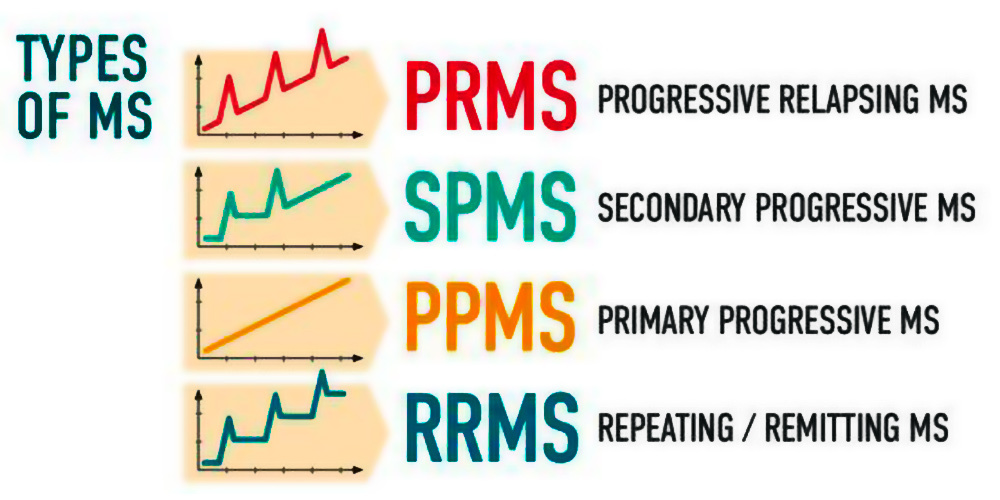Multiple Sclerosis (MS) is a disease that can potentially lead to disability, affecting the brain and spinal cord (central nervous system or CNS). In MS, the immune system targets and damages the protective sheath (myelin) surrounding nerve fibers, which disrupts communication between the brain and the rest of the body. Over time, this condition can result in lasting damage or deterioration of the nerve fibers.
The myelin sheath is essential for the rapid transmission of nerve signals throughout the body. When the myelin sheath is damaged, the signals slow down or become interrupted. This damage leads to various symptoms, and the severity of these symptoms depends on the extent of myelin damage and which parts of the CNS are affected.
Also read: World Multiple Sclerosis Day: Spreading Awareness and Support
Multiple Facets of MS: A Look at MS Types

Multiple sclerosis (MS) presents itself in various forms, each with a distinct disease course. Understanding and testing your knowledge with multiple sclerosis quiz on the different types of multiple sclerosis is essential for managing the condition effectively. Here’s a breakdown of the four main types of MS:
Relapsing-Remitting MS (RRMS):
RRMS is the most common type of MS, affecting approximately 85% of individuals diagnosed initially. RRMS is characterized by well-defined attacks or relapses of symptoms, followed by periods of partial or complete remission where symptoms are significantly improved. These relapses can vary in severity and duration.
-
Secondary-Progressive MS (SPMS):
Approximately 50% of individuals with RRMS transition to Secondary-Progressive MS (SPMS) usually within 10 to 20 years of diagnosis. In SPMS, there is a gradual worsening of neurological function, which means that some symptoms may become more persistent, and new ones may develop. Relapses may become less frequent, but they can still occur in some people with SPMS.
-
Primary-Progressive MS (PPMS):
In this type of MS, symptoms gradually worsen over time. There are no clear relapses or remissions like in other types of MS. PPMS is more common, affecting approximately 10% of people with MS. The speed of deterioration can vary from person to person, but it is generally slower than in other types of MS.
-
Progressive-Relapsing MS (PRMS):
PRMS is a rare type of MS that combines features of both relapsing-remitting MS (RRMS) and primary-progressive MS (PPMS). People with PRMS experience a gradual worsening of symptoms over time, with occasional relapses of varying severity. These relapses may cause new symptoms or worsen existing ones, and recovery from them may be incomplete.
MS Symptoms: Understanding the Signs of the Condition
Symptoms of multiple sclerosis (MS) can vary widely from person to person and may change over time, depending on which nerve fibers are affected. Recognizing symptoms early can make a significant difference. Take the multiple sclerosis quiz below to see how well you know the signs. These symptoms often include:
- Numbness or weakness in one or more limbs, usually on one side of the body at a time
- Tingling sensations
- Electric-shock-like feelings, especially when bending the neck forward (known as Lhermitte sign)
- Difficulty with coordination
- Unsteady walking or inability to walk
- Persistent double vision
- Blurry vision
- Dizziness or vertigo
- Challenges with sexual, bowel, and bladder function
- Fatigue
- Slurred speech
- Cognitive difficulties
- Mood swings
Taking Control: MS Available Treatments
There is no cure for MS, but various treatments can lessen the frequency and severity of relapses and delay the progression of long-term disability, some of them are mentioned below:
- Corticosteroids, like intravenous (infused into a vein) methylprednisolone, are prescribed for three to five days. Intravenous steroids quickly and effectively suppress the immune system and reduce inflammation. They may be followed by a tapered oral corticosteroid dose. Clinical trials have demonstrated that these drugs accelerate recovery from MS attacks, but they do not change the long-term course of the disease.
- Revive Research Institute, located in Rochester Hills, Michigan, is conducting clinical trials for Multiple Sclerosis. These trials focus on investigating new potential treatments for patients with multiple sclerosis who are currently stable on their current treatment and have not experienced recent relapses.
- Injectable medications are administered through injections and are often used as first-line treatments for MS. Interferons such as Avonex and Rebif work by modulating the immune system to reduce inflammation and slow down the progression of the disease.
- Oral medications are taken orally, making them more convenient for some patients. Fingolimod (Gilenya) works by trapping certain white blood cells in the lymph nodes, reducing their ability to contribute to nerve damage. Dimethyl fumarate (Tecfidera) is believed to have anti-inflammatory and neuroprotective effects. Teriflunomide (Aubagio) inhibits the function of certain immune cells, reducing inflammation in the central nervous system.
Each of these treatments has its benefits and potential side effects, and the choice of treatment depends on factors such as the patient’s medical history, disease severity, and personal preferences. Patients need to discuss their options with their healthcare providers to determine the most suitable treatment plan for them.
Take the Multiple Sclerosis Quiz
Are you ready to put your newfound knowledge to the test? Let’s dive into the multiple sclerosis quiz and see how much you have learned!
In A Nutshell
Living with Multiple Sclerosis (MS) presents various challenges, but understanding the disease and available treatments can empower individuals to manage their condition effectively. From learning about the different types of MS to recognizing its symptoms and exploring treatment options, this blog provides valuable insights into navigating life with MS. While there is currently no cure for MS, treatments such as corticosteroids, injectable medications, and oral medications can help reduce relapses and delay disease progression. Additionally, ongoing clinical trials offer hope for the development of new treatments. By staying informed and working closely with healthcare providers, individuals with MS can take control of their health and enhance their quality of life. The multiple sclerosis quiz is a great tool for both patients and caregivers. Educate yourself on MS by taking the multiple sclerosis quiz today and enhance your understanding of this complex condition.




